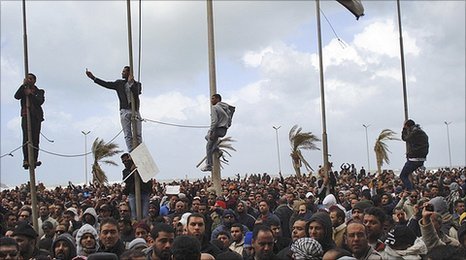Benghazi's vicious revolutions
 Was the current area of revolt in Eastern Libya around Benghazi famed for vicious liberation struggles even in the Roman era?
Was the current area of revolt in Eastern Libya around Benghazi famed for vicious liberation struggles even in the Roman era?
I've just had a call from an American who says I said it was. She heard me talking about On the Spartacus Road last year and says that this was exactly what I said.
Were there places where, as it were, vast pools of bad blood are never far from the surface of the soil?
I'm hesitant about the more general question. Thinking it might be true brings problems itself.
But Cyrene, as the Benghazi area was known in classical times, was certainly home to one of the wilder recorded revolts against the Romans.
The rebels in 115 AD were Jews, who had won themselves a terrifying reputation for rage and violence, not only tearing down Greek shrines to Apollo, Artemis and Hecate but killing with a viciousness that was extraordinary even to to the most hardened commentators.
They would "eat the flesh of their victims, make belts for themselves from their entrails, anoint themselves with their blood and wear their skins for clothing: many they sawed in two from the head downwards; others they gave to wild beasts; and still others they forced to fight as gladiators."
These opponents of the Roman order were believed to roast their captives alive.
I quoted this in Spartacus Road because Appian, one of the fairer historians of the Spartacus slave war, was caught up in this Cyrene revolt in the Nile delta as a young man. He was the writer on Spartacus who best knew what it was like to be pursued by rebels of highly unreliable behaviour.
Some of those charges were probably anti-Jewish propaganda. We know them from Xiphilinus, who was working from books of Dio's history now lost, and was not known for love of Jewish causes.
But there was certainly something nasty then around Benghazi and there is no reason to think that Appian would have disbelieved the charges.
The Jewish rebels were said to have destroyed bath-houses and colonnades because they were Roman, and killed to the orders, so it was said, of a man they called their Messiah. For Greek and Roman settlers, ensconced in Cyrene since the Spartacus revolt itself ,this was a very nasty surprise.
Appian escaped and lived on to see how legionary power crushed the revolt, the most dangerous Jewish uprising in Roman history, and how the Senate taxed the survivors to restore the ruined temples.
He described how the once-threatening King of the Jews was turned into a theatrical effigy, a Guy Fawkes of the Estern mediterranean and made a regular and exemplary spectacle to discourage imitators.
This is the story to which my American caller was referring. Whether it has any relevance to the present troubles, I very much doubt.
Peter Stothard's Blog
- Peter Stothard's profile
- 30 followers



